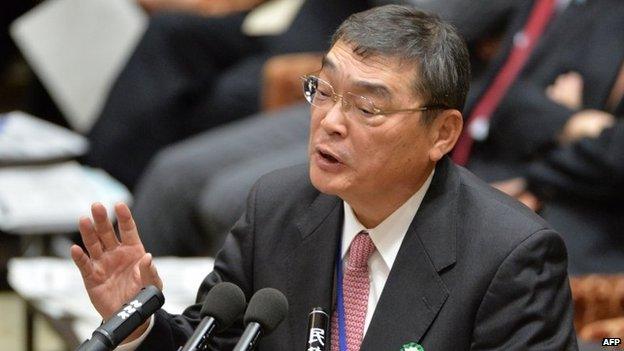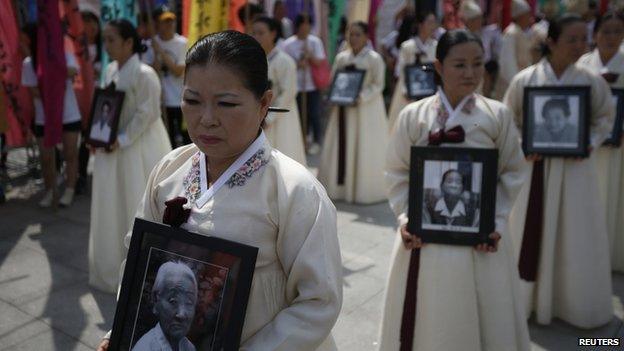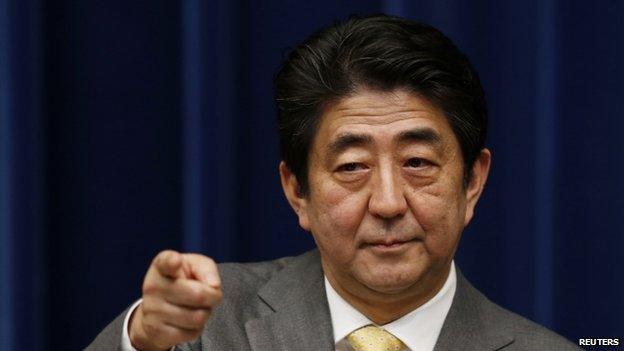Is Japan's public broadcaster under threat?
- Published

Katsuto Momii sparked outrage with his first press conference as NHK president
Japan's public broadcaster, NHK, was created to provide independent news to a nation. But recent appointments have raised fears that its independence is at risk, reports Mariko Oi.
At noon on 15 August 1945, the Japanese people heard for the first time the voice of a man they had long believed was a living god. It was Emperor Hirohito's announcement, carried by the Japan Broadcasting Corporation (NHK), that World War Two was over and Japan had surrendered.
NHK, established in 1926, has for decades provided television and radio channels free from commercial influence.
Like many other publically-funded media organisations, it has faced accusations of bias in the past. But now, as one former senior NHK executive, Kohei Ihashi, puts it: "NHK is facing its biggest crisis ever."
Last year, Katsuto Momii was named NHK's new chairman, in a move seen as backed by conservative Prime Minister Shinzo Abe.
At his first press conference on 25 January, Mr Momii's remarks that Japan's use of wartime sex slaves was not unique made international news headlines.
But what attracted attention locally was this comment: "We cannot turn left when the government says right."
Mr Momii said NHK's coverage should support the government in its regional territorial disputes. When asked about a state secrecy law which imposes stiff penalties on whistleblowers, he said it was "nothing to worry about".
There was immediate reaction on social media. "NHK has officially become Abe's propaganda network," was one representative response on Twitter.
It was then revealed that Mr Momii demanded undated resignation letters from all 10 managing directors on NHK's executive board on his first day. Questioned by opposition lawmakers, he said it was a standard move - something business leaders subsequently shot down.

The issue of World War II sex slaves, also known as "comfort women", still haunts Japan
'Pressure'
It is not just Mr Momii who is causing concern. NHK's board of governors , externalconsists of 12 members, four of whom were appointed by Mr Abe in November. Two of them have also made headlines.
Novelist Naoki Hyakuta angered China when he said the Nanjing massacre never happened. He also said that the Tokyo war crimes trials were a US attempt to cover up "cruel massacres" in Tokyo, Hiroshima and Nagasaki - comments that provoked US diplomatic outrage.
Michiko Hasegawa, a professor emeritus, also caused a stir when she wrote in a newspaper that a "woman's most important job is to give birth to and raise children". A separate essay praised a right-wing activist who committed suicide in 1993.
Mr Abe has steered clear of commenting on these remarks. But critics believe this means he agrees with them and is trying to influence NHK by appointing those who share his political agenda.
"Abe's personalisation of NHK" is the term coined by bloggers and journalists. Jin Igarashi, professor at Hosei University's Ohara Institute for Social Research, called it the "hijacking of NHK".
The controversy comes amid concern from Japan's neighbours that Mr Abe's right-wing government is sympathetic to historical revisionists who argue Japan's wartime atrocities have been greatly exaggerated.

Critics fear Mr Abe is trying to influence NHK by appointing those who share his political views
In Japan, some lawmakers applauded Mr Momii's comments on sex slaves - euphemistically called "comfort women" in Japan - as "spot on accurate".
Others said NHK's focus on promoting government policy was a necessary correction to a perceived left-wing, international-looking stance.
Nobuo Ikeda, a professor at Jobu University and a former NHK correspondent, however, questioned how much influence Mr Momii and the governors would have on day-to-day editorial decisions.
Current NHK staff contacted by the BBC all declined to comment on the record (Mr Momii also declined to comment), but a former employee believes there will be an inevitable impact.
"I think Mr Momii's comments will undoubtedly put pressure on reporters when they are handling sensitive topics such as the secrecy law and comfort women," said Yosei Ide, who is now a member of parliament.
"Even if the reporters themselves manage to rise above the political pressure, their bosses will double and triple-check their scripts and it will be very difficult for them to ignore it altogether."
Mr Abe was accused of trying to influence NHK earlier in his career over a 2001 documentary about sex slaves. He later said he had a conversation with the programme's producers but did not pressure them.
His key ally, Yoshihide Suga (now the top government spokesman), was in 2006 - during Mr Abe's first term in office - also alleged to have ordered NHK to report more on the kidnapping of Japanese citizens by North Korea in the 1970s and 1980s.
One current NHK staff member told the BBC on condition of anonymity: "With the same combination [of Abe and Suga], we have been girding for an anticipated attack."
'Unprecedented'
Ellis Krauss, professor at the University of California and author of Broadcasting Politics in Japan: NHK and Television News, said NHK should be protected by the Broadcast Law which forbids the government from interfering directly in programming.
But he notes that the government, especially the governing LDP, has used "behind-the-scenes and subtle ways of influencing the broadcast agency".
Someone in Mr Momii's position, however, has "generally tried, publicly at least, to project an image of objectivity," Prof Krauss added. "What's different about the current incident is [that] the appointment of a crony of the prime minister's with such right-wing views is unprecedented."
Kohei Ihashi, who was a senior member of NHK's General Planning and Policy Division, said Mr Abe's move to appoint allies was "backfiring because some of their comments have now become international issues".
There are now demands not just for Mr Momii to resign but also for the whole process of appointing the organisation's chairman and governors to be changed.
Mr Momii has apologised for his comments on sex slaves. Earlier this month, he told parliament that they were due to "his lack of understanding regarding NHK's role as a public broadcaster".
He faces a steep learning curve if he is to keep his role.
- Published4 February 2014
- Published27 January 2014
- Published26 January 2014
- Published29 May 2013